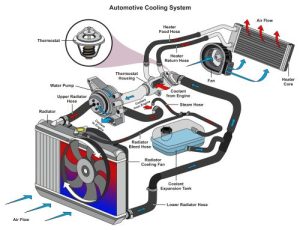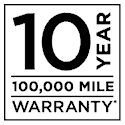Your Kia’s engine operates at a high temperature due to the heat from combustion. The radiator is a vital part of the cooling system, which allows the engine work to work at its most efficient level but protects it from overheating. The radiator can suffer damage over time due to the constant heat and high pressure. As your Kia dealer, we’d like you to know a few signs that you need to visit us for a radiator repair.
Signs You Need a Radiator Repair at Your Kia Dealer

Corroded Radiator
Your radiator is made from aluminum and plastic. This reduces the weight in the front of your car yet allows it to work very efficiently. Aluminum doesn’t rust, but it can corrode if it’s exposed to water. Water causes a chemical reaction that will eat through the aluminum and cause a leak. Your radiator is protected against corrosion by the hood and grille.
The coolant that transports heat to the radiator for removal is a mixture of water and antifreeze. Coolant can leak from several places, including a damaged radiator cap or a loose radiator hose. If your radiator is corroding, coolant will leak out, and your engine will overheat very quickly. We can’t repair a corroded radiator, but we can install a new one for you.
Worn Radiator Hoses
The radiator is connected to the cooling system by two rubber hoses. These hoses are designed to transport hot coolant that can reach over 300F. The hoses are tightly attached to the radiator and then secured with strong metal clamps. As part of a radiator service, we check the condition of the hoses and the clamps to ensure they’re in good condition.
Despite their strength and durability, the radiator hoses become less flexible as they age. The reduced flexibility can cause cracks in the hose as they flex when the coolant passes through them at high speed. Heat and pressure will cause these cracks to deepen, and one or both hoses can leak coolant. We’ll examine the hoses, and we can replace them if they’re damaged.
Rising Temperature Gauge
Your engine works most efficiently at a temperature between 195F and 220F. When you start your car, the temperature will rise to this point, and then the cooling system will kick in. Coolant is pumped through the engine to maintain the temperature and protect your engine against overheating.
A rising temperature gauge means something is wrong with the cooling system. If this happens, we advise switching the engine off and allowing it to cool. If the temperature continues to climb when you switch the engine on again, contact us ASAP. Our skilled technicians will examine the cooling system and fix the problem before it causes any damage.
If you suspect there’s a problem with your cooling system, call us right away at Coughlin Kia of Newark.




 Warranties include 10-year/100,000-mile powertrain and 5-year/60,000-mile basic. All warranties and roadside assistance are limited. See retailer for warranty details.
Warranties include 10-year/100,000-mile powertrain and 5-year/60,000-mile basic. All warranties and roadside assistance are limited. See retailer for warranty details.